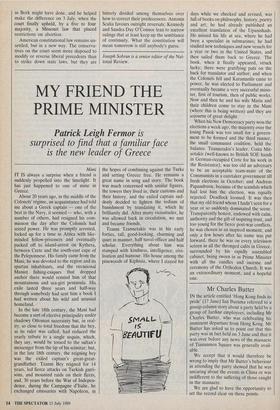MY FRIEND THE PRIME MINISTER
Patrick Leigh Fermor is
surprised to find that a familiar face is the new leader of Greece
Mani IT IS always a surprise when a friend is suddenly propelled into the limelight. It has just happened to one of mine in Greece.
About 20 years ago, in the middle of the Colonels' regime, an acquaintance had told me about a Greek captain — one of the best in the Navy, it seemed — who, with a number of others, had resigned his com- mission the day after the Colonels had seized power. He was promptly arrested, locked up for a time in Attica with like- minded fellow-prisoners and eventually packed off to island-arrest on Kythera, between Crete and the south-east cape of the Peleponnese. His family came from the Mani; he was devoted to the region and its spartan inhabitants, and the occasional Maniot fishing-caiques that dropped anchor there would remind him of that mountainous and sea-girt peninsula. His exile lasted three years and half-way through somebody had sent him a book I had written about his wild and unusual homeland.
In the late 18th century, the Mani had become a sort of elective principality under shadowy Ottoman suzerainty but, in real- ity, so close to total freedom that the bey, as its ruler was called, had reduced the yearly tribute to a single sequin, which, they say, would be tossed to the sultan's messenger from the tip of his scimitar; but, in the late 18th century, the reigning bey was the exiled captain's great-great- grandfather. Tzanni Bey reigned for 14 years, led fierce attacks on Turkish garri- sons, and mounted raids on their fleets, and, 30 years before the War of Indepen- dence, during the Campagne d'Italie, he exchanged emissaries with Napoleon, in the hopes of combining against the Turks and setting Greece free. He remains a great name in song and story. The book was much concerned with similar figures, the towers they lived in, their customs and their history, and the exiled captain sud- denly decided to lighten the tedium of banishment by translating it, which lie brilliantly did. After many vicissitudes, he was allowed back in circulation, we met and became friends.
Tzanni Tzannetakis was in his early forties, tall, good-looking, charming and quiet in manner, half naval officer and half scholar. Everything about him was stamped with kindness, intelligence, civi- lisation and humour. His house among the pinewoods of Kiphisia, where I stayed for days while we checked and revised, was full of books on philosophy, history, poetry and art; he had already published an excellent translation of the Upanishads. He missed his life at sea, where he had been a specialist in submarines; he had studied new techniques and new vessels for a year or two in the United States, and then sailed them back to Greece. The book, when it finally appeared, struck lucky; there were gratifying pats on the back for translator and author; and when the Colonels fell and Karamanlis came to power, he was elected to Parliament and eventually became a very successful minis- ter, first of tourism, then of public works. Now and then he and his wife Maria and their children come to stay in the Mani (where this is being written) and they are sojourns of great delight.
When his New Democracy party won the elections a week ago, the majority over the losing Pasok was too small for a govern- ment to be formed and the third runner, the small communist coalition, held the balance. Tzannetakis's leader, Costa Mit- sotakis (well-known to British SOE hands in German-occupied Crete for his work in the Resistance), was too old an adversary to be an acceptable team-mate of the Communists in a caretaker government till fresh elections in October; and Andreas Papandreou, because of the scandals which had lost him the election, was equally rejected. Deadlock loomed. It was then that my old friend whom I hadn't seen for a year or so suddenly dominated the scene. Transparently honest, endowed with calm, authority and the gift of inspiring trust, and too young for the fierce post-war conflicts, he was chosen in an inspired moment, and only a few hours after his name was put forward, there he was on every television screen in all the thronged cafes in Greece, surrounded by his rapidly assembled cabinet, being sworn in as Prime Minister with all the candles and incense and ceremony of the Orthodox Church. It was an extraordinary moment, and a hopeful one.


















































 Previous page
Previous page